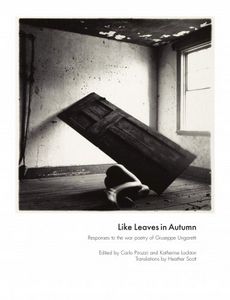Published to mark the first centenary of Italy’s entry into the Great War, Like Leaves in Autumn features 21 original Italian poems by Giuseppe Ungaretti, with new English translations by Heather Scott. These are set alongside 21 new poems by contemporary Scottish poets writing in response to Ungaretti, and are illustrated with striking black-and-white artworks from the ARTIST ROOMS collection, owned by National Galleries of Scotland and Tate.
this anthology offers a creative interplay of recollection, translation and new inspiration. Italian, English, Scots and Gaelic voices mingle on these pages, and the artworks spark a dialogue between words and images, creating an alchemy of further meanings. Back cover:
From Wikipedia:
Giuseppe Ungaretti (Italian: [dʒuˈzɛppe uŋɡaˈretti]; 8 February 1888 – 2 June 1970) was an Italian modernist poet, journalist, essayist, critic, academic, and recipient of the inaugural 1970 Neustadt International Prize for Literature. A leading representative of the experimental trend known as Ermetismo ("Hermeticism"), he was one of the most prominent contributors to 20th century Italian literature. Influenced by symbolism, he was briefly aligned with futurism. Like many futurists, he took an irredentist position during World War I. Ungaretti debuted as a poet while fighting in the trenches, publishing one of his best-known pieces, L'allegria ("The Joy").
During the interwar period, Ungaretti was a collaborator of Benito Mussolini (whom he met during his socialist accession),[1] as well as a foreign-based correspondent for Il Popolo d'Italia and Gazzetta del Popolo. While briefly associated with the Dadaists, he developed Hermeticism as a personal take on poetry. After spending several years in Brazil, he returned home during World War II, and was assigned a teaching post at the University of Rome, where he spent the final decades of his life and career. His fascist past was the subject of controversy.
One of Europe’s greatest modernist poets, Ungaretti was born and raised in Alexandria, Egypt, to an Italian family from Tuscany. From 1915, he served in the Italian infantry in the campaign against Austria-Hungary. It was a ferocious conflict fought in the mountains of Northern Italy in trenches dug out of Alpine rock. Thousands died and Ungaretti’s poems, written during pauses in the fighting, channel these horrific experiences. In addition to his grief and loss, these verses are shaped both by Ungaretti’s sense of exile and by his intense life-affirming poetic sensibility.
A century on,
